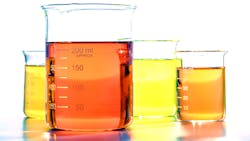Alternative diesel fuel options for greener fleets
As regulations to reduce emissions and increase fuel economy become more stringent, the use of alternative fuel sources has increased in recent years. Alternative fuels are valued not only for their positive environmental impact, but also for their efficiency and continuous advancements.
Biomass-based diesel fuels include biodiesel and renewable diesel. Both are non-fossil fuels made from waste such as vegetable oil, fats, and greases, but differ in how they are produced and in their physical properties. Here is a closer look at each fuel, along with their benefits, impact on diesel engines, and future trends.
Biodiesel vs. renewable diesel
Biodiesel is made using a chemical reaction called transesterification and is approved for blending with traditional petroleum diesel. It is often found in blends of up to B20 (a blend containing 20 percent biodiesel and 80 percent petroleum diesel) and meets the American Society for Testing and Materials (ASTM) D6751 quality standards, ensuring use in low-percentage blends without causing significant problems with diesel engines.
“Biodiesel blends have shown to reduce total emissions up to 80 percent,” says Phillip McGuffee, operations manager at Green Energy Biofuel, a recycling company and producer of biodiesel.
Renewable diesel, also known as hydrotreated vegetable oil (HVO), is made by using a process called hydrotreating. Renewable diesel meets the fuel specification requirements of ASTM D975 for petroleum diesel and therefore does not require blending.
With a similar chemical composition to petroleum diesel, renewable diesel can be used as a direct replacement for fleets.
“Renewable diesel does not contain olefins or aromatics,” says Jason Martin, manager of heavy duty engine thermodynamics at Detroit Diesel, an American diesel engine manufacturer. “Both biodiesel and renewable diesel can reduce hydrocarbon and particulate emissions, [however] we recommend renewable diesel because it is the only fuel that offers a reduction in NOx emissions and does not contain catalyst poisons.”
Impacts on engines and engine components
Most diesel engines today are designed to run on biodiesel B20 and renewable diesel with no negative effects.
However, Detroit Diesel’s Martin advises that when using B20, fleets still need to run good, quality fuel to avoid problems with filter plugging, fuel system deposits, or aftertreatment poisoning.
Renewable diesel contains higher levels of cetane than both petroleum diesel and biodiesel, which results in a cleaner burn and can contribute to smoother and quieter combustion.
“Because of its much higher cetane number, renewable diesel provides more efficient combustion,” says Matt Leuck, technical manager of Renewable Road Transportation in North America at Neste, a global producer of renewable diesel. “This leads to less soot in EGR (exhaust gas recirculation) coolers and EGR valves, and less particulate matter that can plug diesel particulate filters.”
With less soot and particulate matter, maintenance intervals can be reduced on these components, Leuck notes.
“The fact that [renewable diesel] fuel is much cleaner also means operators can expect less fuel filter plugging, fewer injector deposits, quicker cold starts, and fewer harmful emissions at the tailpipe,” Leuck adds.
For heavy duty truck manufacturer Daimler Trucks North America, renewable diesel is not only the better alternative for biofuels but offers many additional advantages when it comes to vehicle engines and fuel systems.
Detroit Diesel’s Martin lists a few of these advantages:
- It is the only fuel that can be used in trucks at 100 percent blend levels without risk to the engine and aftertreatment system.
- It does not oxidize, so it is suitable for long term storage.
- It is generally free from metal contaminants, which are the building blocks of fuel system deposits and are harmful to aftertreatment systems.
- It is the only fuel that lowers CO2, NOx, HC, and PM.
Use of fuel additives
One potential downside to biodiesel is that it has a higher risk of thickening, or gelling, in cold temperatures than petroleum diesel, depending on the type of oil used. The probability of gelling increases when the fuel is blended at B10 or higher.
Kevin Griffith, fuel additive product manager at Lubrizol, a provider of specialty transportation-related fluids, suggests using a cold-flow improver.
“Unfortunately, there is not a one-size-fits-all anti-gel product since biodiesel characteristics can vary widely by source,” says Griffith. “However, for fleets interested in using biodiesel throughout the winter season, Lubrizol can recommend an effective cold flow improver additive that will achieve the desired winter operability of their fuel blends.”
Other concerns for fleets using biodiesel may include occurrences of corrosion in the fuel system or reduced thermal oxidative stability.
Spencer Martineau, diesel additive product manager at Lubrizol recommends utilizing a multifunctional diesel fuel additive that contains a deposit control additive (DCA) to alleviate these concerns.
“DCAs have corrosion performance capabilities that help mitigate corrosion brought by biodiesel due to increased water content of the fuel,” Martineau notes. “They can also increase the oxidative stability of the biodiesel, therefore inhibiting the formation of sludge and other deposits that can severely impact the fuel system.”
In addition, multifunctional diesel fuel additives that contain a DCA can help remove and prevent fuel injector deposits which allow for a more efficient and complete combustion cycle, Martineau adds.
Although renewable diesel is proven to burn more completely – and cleanly – fleets running on this fuel source may further increase performance through the use of fuel additives.
“Even with renewable diesel helping to prevent future fuel injector deposit formations by being a cleaner and more efficient burning fuel, fleets of different ages and sizes can still be affected by fuel injector deposits found in high pressure common rail fuel injection (HPCR) systems,” Martineau says.
“To prevent and remove these types of fuel injector deposits, multifunctional diesel fuel additives containing DCA [can] be used in conjunction with renewable diesel to increase the performance of the fuel and its clean up abilities of these deposits, [as well as] improving fuel economy further,” Martineau adds.
Availability, cost, and future outlook
Currently, availability of renewable diesel is limited. As supply continues to grow with increased production, costs associated with renewable diesel are expected to fall, making the fuel more affordable for fleets.
“In markets where available, renewable diesel is competitive with traditional diesel,” Neste’s Leuck says. “It will become easier and easier for customers to affordably access renewable diesel as more states and regions adopt policies that encourage the use of renewable, low emission fuels.”
In 2023, Neste expects to bring online significant volumes of new renewable diesel production as they continue to expand their network of renewable diesel fueling stations and partnerships with new distributors.
Leuck predicts the demand for renewable diesel to “increase five-fold before the end of the decade.”
“This growth is driven by two key things,” he notes. “Businesses are setting ambitious climate goals and governments are adopting policies that incentivize the use of lower emission, renewable fuels.”
Daimler’s Martin agrees that the future of renewable diesel is only getting stronger.
“There are a number of solutions to achieve a carbon-neutral future, and low carbon fuel standards (LCFS) will be part of the mix for the foreseeable future,” he says. “We expect renewable diesel penetration to grow as a biofuel. Other than limited availability, there are no significant penalties associated with using this fuel. There are a number of new production facilities in construction throughout the U.S.”
The future for biodiesel also looks bright.
Modern biodiesel production continues to convert fuels from lower and lower quality waste streams. By doing so, biodiesel will be present in diesel fuel blends around the world, providing economic and environmental benefits, Green Energy Biofuel’s McGuffee says.
Biomass-based diesel presents fleets a number of benefits. Both are made from renewable sources, burn clean, reduce their carbon footprint up to 80 percent, and neither require engine modifications.
According to Leuck, biomass-based diesel fuel can help fleet operators “transform their vehicles from fossil-fueled to fossil-free practically overnight, with no extra costs.”
About the Author
Kayla Oschmann
Assistant Editor | Vehicle Repair Group
Kayla Oschmann is assistant editor for the Vehicle Repair Group.
With an education in journalism and public relations, Oschmann contributes to Fleet Maintenance, PTEN, and Professional Distributor magazines, as well as VehicleServicePros.com.

